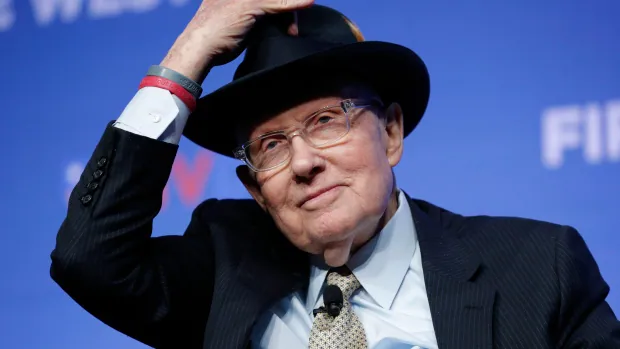Harry Reid, the former U.S. Senate majority leader and Nevada’s longest-serving member of Congress, has died. He was 82.
Reid died Tuesday, “peacefully” and surrounded by friends “following a courageous, four-year battle with pancreatic cancer,” Landra Reid said of her husband in a statement.
“Harry was a devout family man and deeply loyal friend,” she said. “We greatly appreciate the outpouring of support from so many over these past few years. We are especially grateful for the doctors and nurses that cared for him. Please know that meant the world to him.”
Funeral arrangements would be announced in the coming days, she said.
The combative former boxer-turned-lawyer was widely acknowledged as one of toughest dealmakers in Congress, a conservative Democrat in an increasingly polarized chamber who vexed lawmakers of both parties with a brusque manner and this motto: “I would rather dance than fight, but I know how to fight.”
Over a 34-year career in Washington, Reid thrived on behind-the-scenes wrangling and kept the Senate controlled by his party through two presidents — Republican George W. Bush and Democrat Barack Obama — a crippling recession and the Republican takeover of the House after the 2010 elections.
In spite of furious Republican opposition, Reid in 2010 helped secure congressional passage of Obama’s signature health-care law known as Obamacare.
“He was my leader, my mentor, one of my dearest friends,” Sen. Chuck Schumer said in a statement. “He’s gone but he will walk by the sides of many of us in the Senate every single day.”
Acrimonious relationships
In 2012, Mitch McConnell, then the Senate’s top Republican, labelled Reid “the worst leader in the Senate ever,” while Reid accused McConnell of a “breach of faith” on an important issue. That same year, Reid accused Republican John Boehner of running a “dictatorship” as House speaker.
During Reid’s time as majority leader, major legislation languished because Democrats and Republicans could not make compromises, with each side blaming the other. His relationship with McConnell was so strained that the Republican leader shunned Reid during crucial U.S. fiscal policy talks and dealt directly with then U.S. vice-president Joe Biden, a Democrat and former senator whom McConnell trusted.
In 2013, fed up with Republican procedural moves blocking Obama’s judicial and executive branch nominees, Reid pushed through the Senate a historic change to the Senate’s filibuster rules, preventing a minority party from blocking presidential appointments except those to the Supreme Court.
“There has been unbelievable, unprecedented obstruction,” Reid told his fellow senators, referring to the Republicans. “The Senate is a living thing and to survive it must change as it has over the history of this great country.”
Republicans said the move was a naked power grab.
Reid retired in 2016 after an accident left him blind in one eye.
In May 2018, he revealed he’d been diagnosed with pancreatic cancer and was undergoing treatment.


